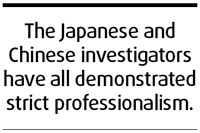A responsible path to ending dumpling issue
Updated: 2008-02-25 07:18
A team of senior Chinese police officers went to Japan last Wednesday to assist with the investigation into the alleged poisoning of Chinese-made dumplings there.
And on February 15, the State Council Information Office and the General Administration of Quality Supervision, Inspection and Quarantine (AQSIQ), China's food safety watchdog, held a joint press conference to release the latest developments in the case.
These are the most recent Chinese responses to take place since Japanese media reported the case on January 30.

At least 10 people in Japan's Hyogo and Chiba prefectures reported stomachaches, vomiting or diarrhea after eating the dumplings.
The Japanese government examined the vomit of the poisoned people as well as the food packages at their houses, and found enough methamidophos, a pesticide, to poison humans. The investigation by Japanese police also found traces of the chemical on the dumpling packaging.
During the first week of this month, Chinese investigators inspected the manufacturer, Tianying Food Plant, in Hebei Province, but found nothing irregular. Nor did they find any problems related to the purchase of raw materials or the production process.
On February 13, a senior AQSIQ official said the dumplings involved in the food poisoning incident were "an isolated case", rather than the result of a general food safety problem.
Based on my own experiences working as a correspondent in Japan, I know that food safety is a delicate issue there.
In 1984, a criminal gang tried to extort money from confectionery makers by placing cyanide-laced sweets on store shelves, triggering an extensive scare across the country. The incident pushed one of the country's biggest candy makers to the brink of bankruptcy.
Exports from China to Japan have been increasing dramatically in recent years, and food is one of the most important export categories.
There have been several disputes between China and Japan about the safety of these goods.
Given the huge volume of the bilateral trade, it is natural that such disputes emerge. Given such circumstances, it is necessary for the two countries to have a cool-minded and objective attitude when it comes to settling disputes.
A constructive stance for working through such problems would be to facilitate an unbiased investigation and ensure that all analyses and conclusions are free from manipulation and influence.
It would hurt the interests of both sides if either one of them tried to "demonize" the other or to inflate a trade matter into a political dispute. After all, an overt or baseless emphasis on conspiracies or ideology will only make it harder to catch the person responsible for harming the health of the public.
Fortunately, the Japanese and Chinese investigators have all demonstrated strict professionalism in their inspections. The Chinese watchdog responded in a timely manner to the Japanese media reports, and the maker of the dumplings cooperated with the inspectors actively.
After seeing conditions at the plant that made the dumplings, the Japanese team said the factory was run properly and that no malpractice had been found.
The responsible and sensible attitudes of the Japanese and Chinese authorities have served to facilitate the investigation.
However, some media in Japan and other Western countries have not shown such professionalism and have been making groundless comments about the quality and safety of all Chinese food.
Actually, the Chinese authorities offered to cooperate with Japan in establishing a food safety framework, which could serve to ensure food safety over the long term.
China already has such a system in place with United States and the European Union.
The framework covers the safety system for food imports and exports, cooperation on supervision and regulation standards, information exchanges and ministerial meetings.
If the Japanese side accepts such an initiative, it would become an effective instrument to ensure food safety, which is a concern for both countries.
It is inevitable that countries will disagree with each other as they become more intensively involved in the process of globalization. But not all disagreements have to do with politics, ethnic differences or problems of history.
Disputes could be resolved more efficiently if people focused on the disputed issues by investigating the truth, pinpointing the loopholes and making due improvements.
A country will not develop a reputation as being a responsible member of the international community unless it faces its problems in an objective and practical manner.
The author is a council member of the China Foundation of International Studies
(China Daily 02/25/2008 page4)
|
|
|
|
|
|